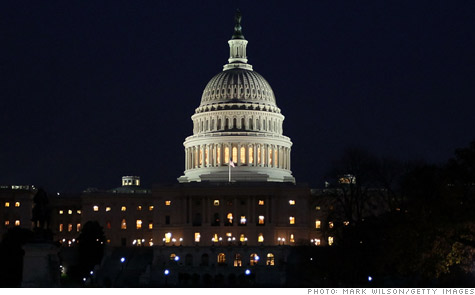
NEW YORK (CNNMoney.com) -- The countdown to a possible government shutdown is on.
If lawmakers don't pass a funding extension by March 4, the government will shift to performing essential operations only. That could mean that government workers would stay home, national parks and museums would close and cleanup at toxic waste sites would stop.
It's difficult to predict how the current government would respond to a shutdown, because each federal agency is responsible for crafting and updating its own "shutdown plan."
Those plans are not made public. But the past offers some clues.
The last time the federal government went dark was for five days in November 1995 and another 21 days, ending in January 1996, during the Clinton administration.
As a result, the government closed 368 National Park Service sites, along with national museums and monuments, according to a Congressional Research Service report.
In addition, 200,000 passport applications went unprocessed, and toxic waste cleanup work at 609 sites stopped, according to the same report. The National Institutes of Health stopped accepting new clinical research patients, and services for veterans, including health care, were curtailed.
A shutdown would also result in the furlough of hundreds of thousands of federal employees, but the government would keep essential services -- like air traffic control, and the national security apparatus -- in full operating mode.
And yes, the mail will still be delivered.
Still, a large number of federal workers would be asked to stay home.
"When we go into a funding hiatus, this restricts activities ... and agencies are going to trim back the number of people who actually show up at the office," Denise Fantone, director of strategic issues at the Government Accountability Office, told CNNMoney the last time a shutdown seemed likely. "The first thing any agency is going to do is pull out their list of essential personnel."
While on furlough, federal employees won't receive a paycheck, nor would government contractors. Federal employees will eventually receive back pay, but contractors won't be so lucky.
The longer the shutdown goes on, the trickier it gets for agencies to define "essential personnel."
During the last long-term shutdown, the Social Security Administration kept enough staff in place to ensure benefits were paid out, but new claims weren't being processed. As the shutdown wore on, the agency recalled workers to start processing new claims.
What has to happen
With Congress in recess this week, lawmakers will have only four working days to pass a spending bill before the current temporary measure expires.
The good news, if you can call it that, is that Congress has come down to the wire many times before and has usually managed to pass a funding bill.
The starting point for negotiations is a bill approved by the House just before dawn on Saturday that would cut $60 billion in federal spending for the current fiscal year.
But that bill would set spending below levels acceptable to Democrats. President Obama said last week he would veto the House measure should it reach his desk.
If lawmakers can't strike a long-term deal that both Senate Democrats and conservative House Republicans will go along with, Congress might resort to passing another short-term measure that would fund the government while negotiations continue on a deal for the rest of the fiscal year.
Typically, lawmakers pass 12 appropriation bills for the president's approval. Those bills give federal agencies the legal authority to spend and conduct business.
This year, not one of the 12 has been approved by the Senate, and Congress has instead relied on short-term measures called "continuing resolutions" in order to fund the government. ![]()






| Index | Last | Change | % Change |
|---|---|---|---|
| Dow | 32,627.97 | -234.33 | -0.71% |
| Nasdaq | 13,215.24 | 99.07 | 0.76% |
| S&P 500 | 3,913.10 | -2.36 | -0.06% |
| Treasuries | 1.73 | 0.00 | 0.12% |
| Company | Price | Change | % Change |
|---|---|---|---|
| Ford Motor Co | 8.29 | 0.05 | 0.61% |
| Advanced Micro Devic... | 54.59 | 0.70 | 1.30% |
| Cisco Systems Inc | 47.49 | -2.44 | -4.89% |
| General Electric Co | 13.00 | -0.16 | -1.22% |
| Kraft Heinz Co | 27.84 | -2.20 | -7.32% |
|
Bankrupt toy retailer tells bankruptcy court it is looking at possibly reviving the Toys 'R' Us and Babies 'R' Us brands. More |
Land O'Lakes CEO Beth Ford charts her career path, from her first job to becoming the first openly gay CEO at a Fortune 500 company in an interview with CNN's Boss Files. More |
Honda and General Motors are creating a new generation of fully autonomous vehicles. More |
In 1998, Ntsiki Biyela won a scholarship to study wine making. Now she's about to launch her own brand. More |
Whether you hedge inflation or look for a return that outpaces inflation, here's how to prepare. More |